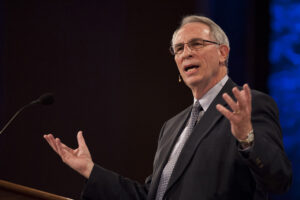
NASHVILLE, Tenn. (BP)–The world’s leading climate change evaluation panel does a poor job of taking into account multiple scientific perspectives, including evidence against human-induced global warming, according to a recent report by the InterAcademy Council.
“The [IAC] criticisms … all point in the same direction, which is that the IPCC [Intergovernmental Panel on Climate Change] is one-sided,” Ross McKitrick, professor of environmental economics at the University of Guelph in Canada, told Baptist Press.
“They don’t do a good job of handling multiple points of view. They have a weak review process so that when they pick lead authors, the lead authors really have a free hand to push their own point of view,” McKitrick said.
The Intergovernmental Panel on Climate Change, established by the United Nations in 1988, has become the most influential scientific body studying climate change, consistently warning about the presumed dangers of greenhouse gases produced by humans.
The InterAcademy Council, created in 2000 by the world’s science academies, provides “high quality advice” to international bodies such as the United Nations and World Bank, according to the IAC’s website.
In 2009, a large body of IPCC e-mails and files released on the Internet pointed to major flaws in its research process. So a series of investigations were launched, including one by the IAC, which released its report Aug. 30.
Though expected to be positive, the IAC report offered significant criticisms.
McKitrick, a longtime climate change researcher and signatory of the Cornwall Declaration on Environmental Stewardship, published on his website a 50-page paper explaining several recent inquiries into the IPCC. In it he highlighted some of the most significant findings of the IAC:
— IPCC report authors “fail to give consideration to a range of scientific views, and nobody verifies whether they have done so,” McKitrick wrote.
— According to the IAC, “The absence of a transparent author selection process [for IPCC reports] or well-defined criteria for author selection can raise questions of bias and undermine the confidence of scientists and others in the credibility of the assessment.”
— Some IPCC recommendations for government policy makers place “more emphasis on what is known, sensational, or popular among Lead Authors” than on what is supported by its reports, the IAC said.
“On all the major issues, [the IAC] really came down on the side of the critics,” McKitrick told BP. “Everything is phrased in very tactful language. But when they really get down to the main issues, they really spotted the problems.”
Had the IPCC conducted itself according to the standards advocated by the IAC, it could never have released its previous reports, according to McKitrick.
But he added that the IPCC likely will ignore the findings and is not bound to implement IAC recommendations.
“I don’t actually think the IPCC is going to reform itself,” McKitrick said. “The IAC report came out, and almost immediately the IPCC chair, [Rajendra] Pachauri made it sound like it was a complete vindication…. He was pretty dismissive of any call for change.”
Unfortunately, governments worldwide take skewed IPCC findings very seriously, McKitrick said, and implementing them results in laws that stall economic growth and hurt the poor.
For example, limiting carbon dioxide emissions on a large scale is impossible without reducing use of fossil fuels, he said. But fuels that produce less carbon dioxide are also more expensive, and forcing the poor to use them would cause financial strain.
“Because energy as a proportion of a household budget is largest in low-income households … there would be disproportionately large effects on low-income households from policies that would limit greenhouse gas emission,” McKitrick said.
Christians should be especially concerned about receiving accurate data on climate change because knowing the truth guides them in stewardship of the environment, he said, and they must balance properly the obligation to keep the environment clean with the obligation to harness natural resources for economic advancement.
“People want to do the right thing in terms of pollution issues and resource management issues,” McKitrick said. “At the same time, we balance those concerns against our obligation to ensure that people can be prosperous and that we don’t harm the poor by the kinds of policies that are put in place. And that remains the big challenge for Christians and for the general public.”
McKitrick also noted some forthcoming research suggesting that human-induced global warming is not as significant a problem as the IPCC argues. One study in Europe, for example, may conclude that climate changes should be explained by solar changes rather than greenhouse gases. He said the European research likely will be published later this year.
–30–
David Roach is a pastor and writer in Shelbyville, Ky. Ross McKitrick’s analysis of the InterAcademy Council’s assessment of the practices and conclusions of the Intergovernmental Panel on Climate Change can be accessed at http://rossmckitrick.weebly.com/uploads/4/8/0/8/4808045/rmck_climategate.pdf.













